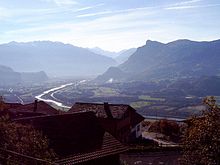Oben am jungen Rhein
| English: High on the young Rhine | |
|---|---|

"Junger Rhein", view from Triesenberg in Liechtenstein
|
|
|
National anthem of |
|
| Lyrics | Jakob Josef Jauch, 1850 |
| Music | Unknown composer (uses the melody of "God Save the Queen") |
| Adopted | 1963 (1920) |
| Music sample | |
|
|
|
"Oben am jungen Rhein" ("High on the young Rhine") has been the national anthem of Liechtenstein since 1920. It shares the same melody as the United Kingdom's national anthem, "God Save the Queen", and Norway's royal anthem, Kongesangen, the only difference being an additional refrain at the end of the song.
The original lyrics were written in 1850 by Swiss pastor Jakob Josef Jauch (1802–1859), at a time when the Principality of Liechtenstein, which is considered the last remnant of the Holy Roman Empire of the German Nation, was a member of the German Confederation. About a decade earlier, French claims to the left bank of the Rhine (Rhine Crisis of 1840) had triggered a series of German "Rhine songs". "Oben am jungen Rhein" was a number of early national anthems with the same tune as "God Save the Queen", but the only one that continues to use the tune. In 1963, the anthem was shortened, and references to Germany were removed.
1. Oben am jungen Rhein
Lehnet sich Liechtenstein
An Alpenhöh'n.
Dies liebe Heimatland,
Das teure Vaterland
Hat Gottes weise Hand
Für uns erseh'n.
1. High on the young Rhine
Lies Liechtenstein, resting
On Alpine heights.
This beloved homeland,
This dear fatherland
Was chosen for us
By God's wise hand.
2. Hoch lebe Liechtenstein,
Blühend am jungen Rhein,
Glücklich und treu.
Hoch leb' der Fürst vom Land,
Hoch unser Vaterland,
Durch Bruderliebe Band
Vereint und frei.
2. Long live Liechtenstein,
Blossoming on the young Rhine,
Fortunate and faithful!
Long live the Prince of the Land,
Long live our fatherland,
Through bonds of brotherly love
United and free!
Until 1963 the anthem's text was:
1. Oben am deutschen Rhein
Lehnet sich Liechtenstein
An Alpenhöh'n.
Dies liebe Heimatland
Im deutschen Vaterland
Hat Gottes weise Hand
Für uns erseh'n.
...
Wikipedia
